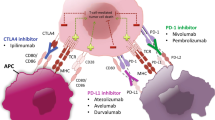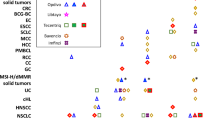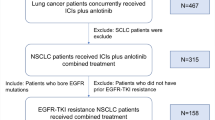Abstract
Immune-checkpoint inhibitors (ICI) are monoclonal antibodies which target molecules to enhance antitumor response. Several adverse events have been described and the major ICI-related endocrinopathies are thyroid dysfunction and hypophysitis. Its occurrence has been associated with improved outcomes, but it is still to be proven. We performed a retrospective study of patients treated with ICI between 2014 and 2019 at an oncologic center to characterize thyroid function test abnormalities (TFTA) and to evaluate clinical outcomes. We excluded patients without regular monitoring of thyroid function, with previous thyroid or pituitary disease, previous head/neck radiotherapy and who performed only one ICI cycle. We included 161 of 205 patients treated with pembrolizumab, nivolumab or ipilimumab for several neoplasms, with a median duration of 18.9 weeks (9.1–42.6) of ICI treatment and 49.4 weeks (26.5–75.8) of follow-up. New-onset TFTA was diagnosed in 18% of patients (n = 29), in median at 10.6 weeks (6.1–31.1) of ICI therapy. On the whole, 8.7% had primary hypothyroidism, 4.3% central hypothyroidism, 2.5% biphasic thyroiditis and 2.5% thyrotoxicosis. Patients who experienced primary or central thyroid dysfunction had a significantly improved overall response rate (58.6% vs 34.2%, p = 0.015) and overall survival (3.27 vs 1.76 years, p = 0.030), compared to the control group. The risk of mortality was two times higher for control group (adjusted HR = 2.43, 95% CI 1.13–5.23, p = 0.023). This study recognizes that primary and central thyroid dysfunction can be a predictive clinical biomarker of a better response to ICI across several neoplasms.


Similar content being viewed by others
Data availability
Data are protected in accordance with indications of Local Ethical Committee.
Abbreviations
- Abs:
-
Antibodies
- BB:
-
Beta-blocker
- CI:
-
Confidence interval
- CTCAE:
-
Common terminology criteria for adverse events
- CTLA-4:
-
Cytotoxic T-lymphocyte-associated protein 4
- DIRE:
-
Delayed immune-related events
- 18FDG-PET/CT:
-
18Fluorodeoxyglucose positron emission tomography/computed tomography
- fT3:
-
Free triiodothyronine
- fT4:
-
Free thyroxine
- HR:
-
Hazard ratio
- ICI:
-
Immune checkpoint inhibitors
- IQR:
-
Interquartile range
- irAEs:
-
Immune-related adverse events
- MSI-H:
-
Microsatellite instability-high
- NSCLC:
-
Non-small-cell lung cancer
- PD-L1:
-
Programmed cell death ligand 1
- PD-1:
-
Programmed cell death protein 1
- TFTA:
-
Thyroid function tests abnormalities
- Tg:
-
Thyroglobulin
- TPO:
-
Thyroid peroxidase
- TRAbs:
-
Thyrotropin receptor antibodies
- TSH:
-
Thyroid-stimulating hormone
- vs:
-
Versus
References
Chalan P, Di Dalmazi G, Pani F, De Remigis A, Corsello A, Caturegli P (2018) Thyroid dysfunctions secondary to cancer immunotherapy. J Endocrinol Invest 41:625–638. https://doi.org/10.1007/s40618-017-0778-8
Pardoll DM (2012) The blockade of immune checkpoints in cancer immunotherapy. Nat Rev Cancer 12:252–264. https://doi.org/10.1038/nrc3239
Page DB, Postow MA, Callahan MK, Allison JP, Wolchok JD (2014) Immune modulation in cancer with antibodies. Annu Rev Med 65:185–202. https://doi.org/10.1146/annurev-med-092012-112807
Hargadon KM, Johnson CE, Williams CJ (2018) Immune checkpoint blockade therapy for cancer: an overview of FDA-approved immune checkpoint inhibitors. Int Immunopharmacol 62:29–39. https://doi.org/10.1016/j.intimp.2018.06.001(S1567-5769(18)30252-2 [pii])
Ferrari SM, Fallahi P, Galetta F, Citi E, Benvenga S, Antonelli A (2018) Thyroid disorders induced by checkpoint inhibitors. Rev Endocr Metab Disord 19:325–333. https://doi.org/10.1007/s11154-018-9463-2
Osorio JC, Ni A, Chaft JE et al (2017) Antibody-mediated thyroid dysfunction during T-cell checkpoint blockade in patients with non-small-cell lung cancer. Ann Oncol 28:583–589. https://doi.org/10.1093/annonc/mdw640
Presotto EM, Rastrelli G, Desideri I et al (2019) Endocrine toxicity in cancer patients treated with nivolumab or pembrolizumab: results of a large multicentre study. J Endocrinol Invest. https://doi.org/10.1007/s40618-019-01112-8
Sibaud V, Meyer N, Lamant L, Vigarios E, Mazieres J, Delord JP (2016) Dermatologic complications of anti-PD-1/PD-L1 immune checkpoint antibodies. Curr Opin Oncol 28:254–263. https://doi.org/10.1097/CCO.0000000000000290
Abdel-Wahab N, Shah M, Suarez-Almazor ME (2016) Adverse events associated with immune checkpoint blockade in patients with cancer: a systematic review of case reports. PLoS ONE 11:e0160221. https://doi.org/10.1371/journal.pone.0160221
Lacouture ME, Wolchok JD, Yosipovitch G, Kahler KC, Busam KJ, Hauschild A (2014) Ipilimumab in patients with cancer and the management of dermatologic adverse events. J Am Acad Dermatol 71:161–169. https://doi.org/10.1016/j.jaad.2014.02.035(S0190-9622(14)01152-9[pii])
Weber JS, Gibney G, Sullivan RJ et al (2016) Sequential administration of nivolumab and ipilimumab with a planned switch in patients with advanced melanoma (CheckMate 064): an open-label, randomised, phase 2 trial. Lancet Oncol 17:943–955. https://doi.org/10.1016/S1470-2045(16)30126-7(S1470-2045(16)30126-7[pii])
Bajwa R, Cheema A, Khan T et al (2019) Adverse effects of immune checkpoint inhibitors (programmed death-1 inhibitors and cytotoxic T-lymphocyte-associated protein-4 inhibitors): results of a retrospective study. J Clin Med Res 11:225–236. https://doi.org/10.14740/jocmr3750
Kassi E, Angelousi A, Asonitis N et al (2019) Endocrine-related adverse events associated with immune-checkpoint inhibitors in patients with melanoma. Cancer Med. https://doi.org/10.1002/cam4.2533
Scott ES, Long GV, Guminski A, Clifton-Bligh RJ, Menzies AM, Tsang VH (2018) The spectrum, incidence, kinetics and management of endocrinopathies with immune checkpoint inhibitors for metastatic melanoma. Eur J Endocrinol 178:173–180. https://doi.org/10.1530/EJE-17-0810
Peiro I, Palmero R, Iglesias P et al (2019) Thyroid dysfunction induced by nivolumab: searching for disease patterns and outcomes. Endocrine 64:605–613. https://doi.org/10.1007/s12020-019-01871-7
Illouz F, Drui D, Caron P, Do Cao C (2018) Expert opinion on thyroid complications in immunotherapy. Ann Endocrinol (Paris) 79:555–561. https://doi.org/10.1016/j.ando.2018.07.007(S0003-4266(18)31185-5[pii])
Campredon P, Mouly C, Lusque A, Bigay-Game L, Bousquet E, Mazieres J, Caron P (2019) Incidence of thyroid dysfunctions during treatment with nivolumab for non-small cell lung cancer: retrospective study of 105 patients. Presse Med 48:e199–e207. https://doi.org/10.1016/j.lpm.2018.10.019(S0755-4982(19)30088-0[pii])
Patel NS, Oury A, Daniels GA, Bazhenova L, Patel SP (2018) Incidence of thyroid function test abnormalities in patients receiving immune-checkpoint inhibitors for cancer treatment. Oncologist 23:1236–1241. https://doi.org/10.1634/theoncologist.2017-0375
Al Mushref M, Guido PA, Collichio FA, Moore DT, Clemmons DR (2019) Thyroid dysfunction, recovery, and prognosis in melanoma patients treated with immune checkpoint inhibitors: a retrospective review. Endocr Pract. https://doi.org/10.4158/EP-2019-0244
Morganstein DL, Lai Z, Spain L, Diem S, Levine D, Mace C, Gore M, Larkin J (2017) Thyroid abnormalities following the use of cytotoxic T-lymphocyte antigen-4 and programmed death receptor protein-1 inhibitors in the treatment of melanoma. Clin Endocrinol (Oxf) 86:614–620. https://doi.org/10.1111/cen.13297
Guaraldi F, La Selva R, Sama MT, D'Angelo V, Gori D, Fava P, Fierro MT, Savoia P, Arvat E (2018) Characterization and implications of thyroid dysfunction induced by immune checkpoint inhibitors in real-life clinical practice: a long-term prospective study from a referral institution. J Endocrinol Invest 41:549–556. https://doi.org/10.1007/s40618-017-0772-1
Faje AT, Sullivan R, Lawrence D, Tritos NA, Fadden R, Klibanski A, Nachtigall L (2014) Ipilimumab-induced hypophysitis: a detailed longitudinal analysis in a large cohort of patients with metastatic melanoma. J Clin Endocrinol Metab 99:4078–4085. https://doi.org/10.1210/jc.2014-2306
Albarel F, Gaudy C, Castinetti F, Carre T, Morange I, Conte-Devolx B, Grob JJ, Brue T (2015) Long-term follow-up of ipilimumab-induced hypophysitis, a common adverse event of the anti-CTLA-4 antibody in melanoma. Eur J Endocrinol 172:195–204. https://doi.org/10.1530/EJE-14-0845
Weber J, Mandala M, Del Vecchio M et al (2017) Adjuvant nivolumab versus ipilimumab in resected stage III or IV melanoma. N Engl J Med 377:1824–1835. https://doi.org/10.1056/NEJMoa1709030
Iglesias P (2018) Cancer immunotherapy-induced endocrinopathies: clinical behavior and therapeutic approach. Eur J Intern Med 47:6–13. https://doi.org/10.1016/j.ejim.2017.08.019(S0953-6205(17)30321-7[pii])
Hryniewicki AT, Wang C, Shatsky RA, Coyne CJ (2018) Management of immune checkpoint inhibitor toxicities: a review and clinical guideline for emergency physicians. J Emerg Med 55:489–502. https://doi.org/10.1016/j.jemermed.2018.07.005(S0736-4679(18)30660-7[pii])
Das S, Johnson DB (2019) Immune-related adverse events and anti-tumor efficacy of immune checkpoint inhibitors. J Immunother Cancer 7:306. https://doi.org/10.1186/s40425-019-0805-8
Barquin-Garcia A, Molina-Cerrillo J, Garrido P, Garcia-Palos D, Carrato A, Alonso-Gordoa T (2019) New oncologic emergencies: What is there to know about inmunotherapy and its potential side effects? Eur J Intern Med 66:1–8. https://doi.org/10.1016/j.ejim.2019.05.020(S0953-6205(19)30178-5[pii])
Tan MH, Iyengar R, Mizokami-Stout K, Yentz S, MacEachern MP, Shen LY, Redman B, Gianchandani R (2019) Spectrum of immune checkpoint inhibitors-induced endocrinopathies in cancer patients: a scoping review of case reports. Clin Diabetes Endocrinol 5:1. https://doi.org/10.1186/s40842-018-0073-4
Chang LS, Barroso-Sousa R, Tolaney SM, Hodi FS, Kaiser UB, Min L (2019) Endocrine toxicity of cancer immunotherapy targeting immune checkpoints. Endocr Rev 40:17–65. https://doi.org/10.1210/er.2018-00006
Barroso-Sousa R, Ott PA, Hodi FS, Kaiser UB, Tolaney SM, Min L (2018) Endocrine dysfunction induced by immune checkpoint inhibitors: practical recommendations for diagnosis and clinical management. Cancer 124:1111–1121. https://doi.org/10.1002/cncr.31200
Girotra M, Hansen A, Farooki A et al (2018) The current understanding of the endocrine effects from immune checkpoint inhibitors and recommendations for management. JNCI Cancer Spectr 2:pky021. https://doi.org/10.1093/jncics/pky021
Gomes-Lima C, Kwagyan J, King F, Fernandez S, Burman K, Veytsman I (2019) A comprehensive meta-analysis of endocrine immune-related adverse events of immune checkpoint inhibitors and outcomes in head and neck cancer and lung cancer. J Clin Oncol 37:e14096. https://doi.org/10.1200/JCO.2019.37.15_suppl.e14096
Kim HI, Kim M, Lee SH et al (2017) Development of thyroid dysfunction is associated with clinical response to PD-1 blockade treatment in patients with advanced non-small cell lung cancer. Oncoimmunology 7:e1375642. https://doi.org/10.1080/2162402X.2017.1375642.1375642[pii]
Velu V, Titanji K, Zhu B et al (2009) Enhancing SIV-specific immunity in vivo by PD-1 blockade. Nature 458:206–210. https://doi.org/10.1038/nature07662
Kotwal A, Gustafson MP, Bornschlegl S, Kottschade L, Delivanis DA, Dietz AB, Gandhi M, Ryder M (2020) Immune checkpoint inhibitor-induced thyroiditis is associated with increased intrathyroidal T lymphocyte subpopulations. Thyroid. https://doi.org/10.1089/thy.2020.0075
Varricchi G, Loffredo S, Marone G, Modestino L, Fallahi P, Ferrari SM, de Paulis A, Antonelli A, Galdiero MR (2019) The immune landscape of thyroid cancer in the context of immune checkpoint inhibition. Int J Mol Sci 20:3934. https://doi.org/10.3390/ijms20163934
Downey SG, Klapper JA, Smith FO et al (2007) Prognostic factors related to clinical response in patients with metastatic melanoma treated by CTL-associated antigen-4 blockade. Clin Cancer Res 13:6681–6688. https://doi.org/10.1158/1078-0432.CCR-07-0187
Bronstein Y, Ng CS, Hwu P, Hwu WJ (2011) Radiologic manifestations of immune-related adverse events in patients with metastatic melanoma undergoing anti-CTLA-4 antibody therapy. AJR Am J Roentgenol 197:W992–W1000. https://doi.org/10.2214/AJR.10.6198
Sarnaik AA, Yu B, Yu D et al (2011) Extended dose ipilimumab with a peptide vaccine: immune correlates associated with clinical benefit in patients with resected high-risk stage IIIc/IV melanoma. Clin Cancer Res 17:896–906. https://doi.org/10.1158/1078-0432.CCR-10-2463
Weber J, Thompson JA, Hamid O et al (2009) A randomized, double-blind, placebo-controlled, phase II study comparing the tolerability and efficacy of ipilimumab administered with or without prophylactic budesonide in patients with unresectable stage III or IV melanoma. Clin Cancer Res 15:5591–5598. https://doi.org/10.1158/1078-0432.CCR-09-1024
Schadendorf D, Wolchok JD, Hodi FS et al (2017) Efficacy and safety outcomes in patients with advanced melanoma who discontinued treatment with nivolumab and ipilimumab because of adverse events: a pooled analysis of randomized phase II and III trials. J Clin Oncol 35:3807–3814. https://doi.org/10.1200/JCO.2017.73.2289
Acknowledgements
The authors thank Darlene Rodrigues (Gerontology and Geriatrics PhD student and Radiation Oncology Resident of Department of Radiotherapy, Centro Hospitalar e Universitário de São João, E.P.E., Porto, Portugal) for support in survival data analysis (orcid number 0000-0001-8170-3952).
Funding
This research did not receive any specific grant from funding agencies in the public, commercial, or not-for-profit sectors. No writing assistance was utilized in the production of this manuscript.
Author information
Authors and Affiliations
Contributions
JLF, ILS, CC and BM were involved in the study concept and design; JLF, CC, SC, MV and ILS were involved in data acquisition. JLF and BM were involved in the analysis and interpretation of the data. JLF drafted the manuscript. APM, BM and CC were involved in critical revision of an early draft of the manuscript. All authors have reviewed the manuscript and approved its final version.
Corresponding author
Ethics declarations
Conflict of interest
The authors declare that they have no conflicts of interest, namely relevant affiliations or financial involvement with any organization or entity with a financial interest in or financial conflict with the subject matter or materials discussed in the manuscript.
Ethical approval
This research study was conducted retrospectively from data obtained for clinical purposes. This study was approved by the Local Ethical Committee of the Instituto Português de Oncologia do Porto (CES.180/020) and has been performed in accordance with the ethical standards as laid down in the 1964 Declaration of Helsinki and its later amendments or comparable ethical standards.
Informed consent
Informed consent was not obtained from each patient, because this retrospective analysis of existing data did not require any interaction with patients and did not intervene in their treatment.
Code availability
Not applicable.
Additional information
Publisher's Note
Springer Nature remains neutral with regard to jurisdictional claims in published maps and institutional affiliations.
Electronic supplementary material
Below is the link to the electronic supplementary material.
Rights and permissions
About this article
Cite this article
Lima Ferreira, J., Costa, C., Marques, B. et al. Improved survival in patients with thyroid function test abnormalities secondary to immune-checkpoint inhibitors. Cancer Immunol Immunother 70, 299–309 (2021). https://doi.org/10.1007/s00262-020-02664-y
Received:
Accepted:
Published:
Issue Date:
DOI: https://doi.org/10.1007/s00262-020-02664-y




